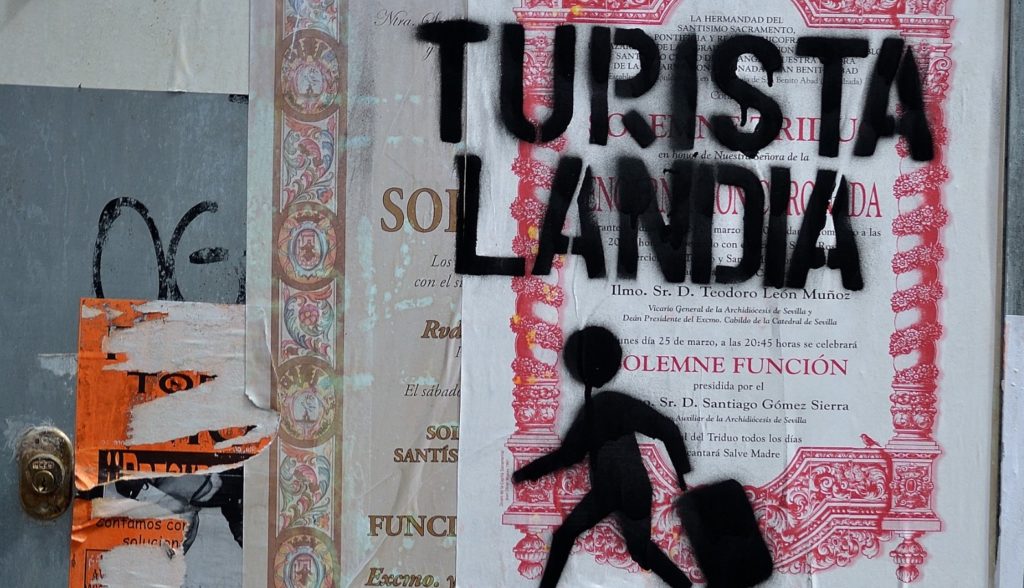By Jamie Jover (@jamiejover)
‘Mass tourism kills the city’ has become a common slogan on stickers and graffiti in many cities across southern Europe. The emergence of short-term holidays lets, especially Airbnb, has triggered the displacement of local populations, as housing has turned (even more) into a asset. Against that situation, social movements have started to organise and fight for the right to housing in different ways.
There is increasing evidence of how Airbnb disrupts the housing market, driving up prices, and welcoming new actors (usually international investors) that purchase a property in a city sometimes even without having ever been there, and with the only purpose of maximizing profits through tourists’ rentals. This is happening across the world, but in certain cities with an economy based on tourism, its impact is stronger. Venice could be the most striking case, with a population of 300,000 and around 25 million people visiting each year the pressures on housing are becoming unmanageable . Athens, Barcelona and Lisbon are also common examples, as well as other touristic, southern European cities, such as Napoli, Porto or Seville.
Seville is an important example of these changes in southern Spain. Despite the city growing in population, its historic district –where most sights and the tourist infrastructure concentrates– has lost 3,600 inhabitants since 2013, when Airbnb landed on the Spanish market. Similarly, there are around 4,000 legal short-term rentals, although estimations raise the figure up to 8,000-9,500, depending on the season, and in a city smaller than Greater Manchester. The City Council keeps welcoming tourism as the key sector for the urban economy, and especially Airbnb, arguing they have helped to rehabilitate vacant houses in the urban centre. However, our reality is different: leases that are not renewed, others that are terminated early, increasing rental prices. Few houses were derelict and have recovered thanks to the so-called ‘sharing economy’. On the contrary, Airbnb is pushing us out. And a range of other impacts are being felt: from noise in neighbouring apartments to the loss of long-standing communities. People are losing the social bonds that connect them to places.
The impact of the process was already noticed in 2016, and by 2017 a few neighbourhood associations, collectives for the right to housing and social movements joined together to cope with it: CACTUS (Collective-Assembly against Touristification in Seville) was born. Ever since, we have hosted two meetings to discuss the topic and spread the word with fellow activists: the first one a national wake-up call in November 2017, and the second in April 2019, within the Southern of Europe facing Touristification Network (SET Net), a conglomerate of 20 cities from Greece, Italy, Malta, Portugal, and Spain. In these meetings, we have talked about the specific impacts on our cities, communities, and bodies; we have shared organisation strategies; we have discussed measures that could be implemented and we have undertaken direct actions (demonstrations, anti-tourism information points, city walks, etc.) Alliances with ecologists, feminist or pro-migration organisations have also proven very useful to raise awareness on a topic that concerns many people in different ways.
Locally, we have managed to push the Council to create a Housing Price Reference Index, an online tool that gathers the price of letting across the city neighbours, and relates it to the (official) number of Airbnb properties. The Index includes information for the last 5 years, showing clearly how rent prices have gone up in those areas more impacted by Airbnb. It also includes a reference housing price, so that people looking for leases have an idea about how much the price per square meter costs in every neighbourhood. However, we have not managed to increase control over Airbnb or stop the government issuing licenses for short-term lettings, meaning the city is facing a unprecedented housing crisis. We have helped achieving other milestones at other scales, such as the reform of the Spanish Lease Act, which reduces the cases by which an owner can kick tenants out, and increases, from 3 to 5 years the maximum period for a lease. And we still have a path to walk in order to lobby at the international, European scale. Yet most importantly, our fight has helped us to bring together people from diverse backgrounds in many neighbourhoods suffering from the increase of Airbnb. The mobilisation against short-term lets, especially Airbnb reinforces the struggle over the right to housing in Seville, it should act as a warning to cities such as Greater Manchester.
Jamie Jover is an academic and activist from Seville who is undertaking research on the impact of Airbnb across Europe.

